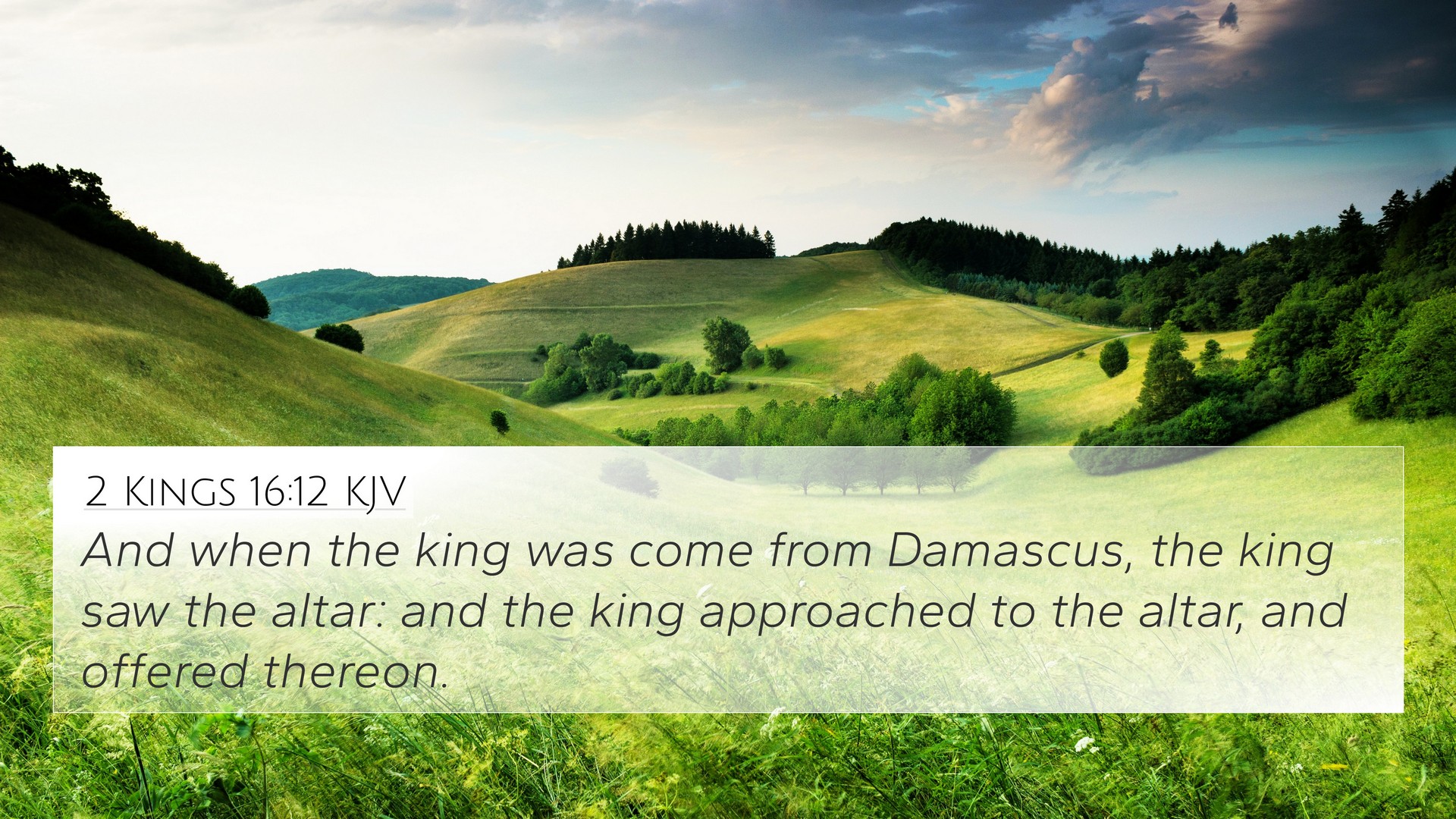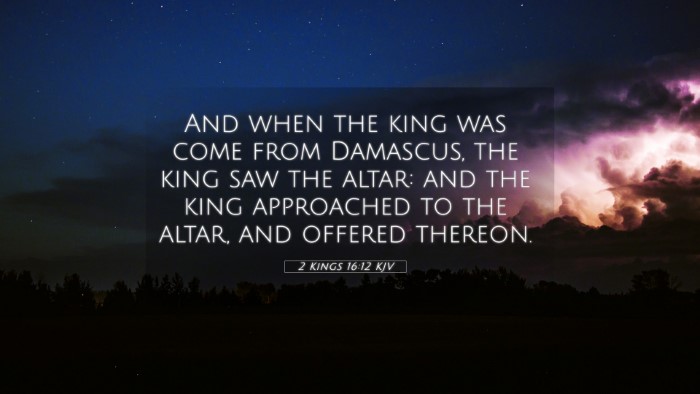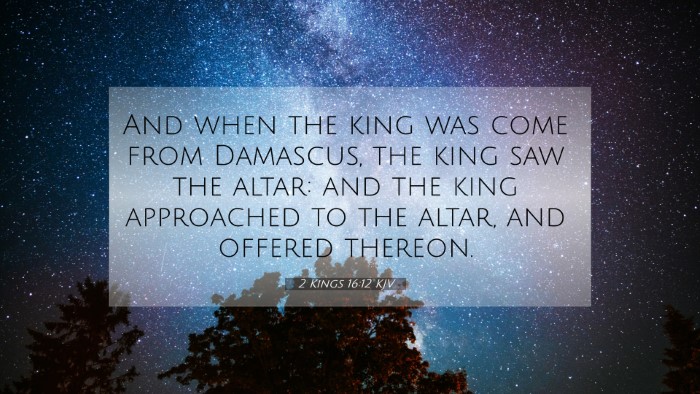Old Testament
Genesis Exodus Leviticus Numbers Deuteronomy Joshua Judges Ruth 1 Samuel 2 Samuel 1 Kings 2 Kings 1 Chronicles 2 Chronicles Ezra Nehemiah Esther Job Psalms Proverbs Ecclesiastes Song of Solomon Isaiah Jeremiah Lamentations Ezekiel Daniel Hosea Joel Amos Obadiah Jonah Micah Nahum Habakkuk Zephaniah Haggai Zechariah Malachi2 Kings 16:12 Similar Verses
2 Kings 16:12 Cross References
And when the king was come from Damascus, the king saw the altar: and the king approached to the altar, and offered thereon.
Uncover the Rich Themes and Topics of This Bible Verse
Listed below are the Bible themes associated with 2 Kings 16:12. We invite you to explore each theme to gain deeper insights into the Scriptures.
2 Kings 16:12 Cross Reference Verses
This section features a detailed cross-reference designed to enrich your understanding of the Scriptures. Below, you will find carefully selected verses that echo the themes and teachings related to 2 Kings 16:12 KJV. Click on any image to explore detailed analyses of related Bible verses and uncover deeper theological insights.
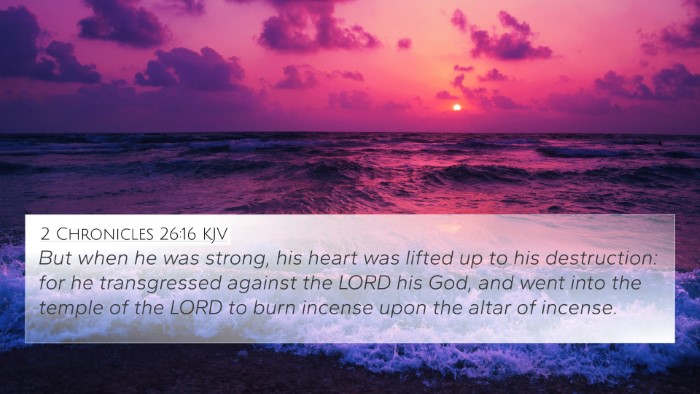
2 Chronicles 26:16 (KJV) »
But when he was strong, his heart was lifted up to his destruction: for he transgressed against the LORD his God, and went into the temple of the LORD to burn incense upon the altar of incense.
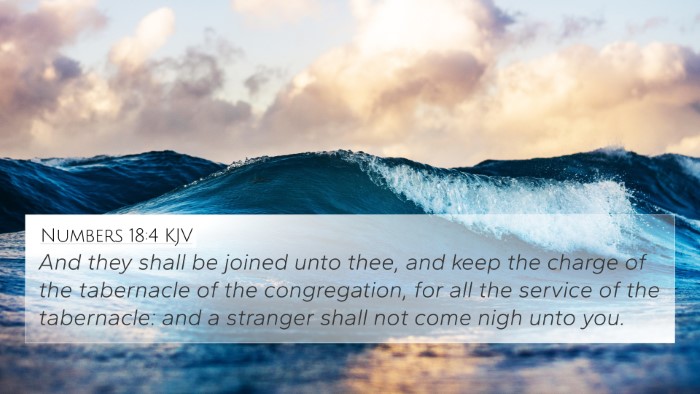
Numbers 18:4 (KJV) »
And they shall be joined unto thee, and keep the charge of the tabernacle of the congregation, for all the service of the tabernacle: and a stranger shall not come nigh unto you.
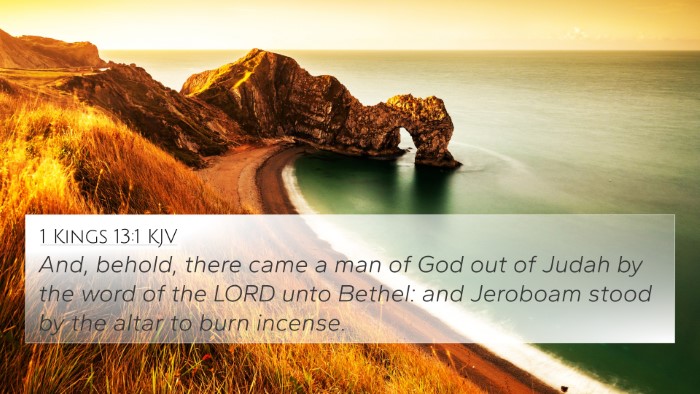
1 Kings 13:1 (KJV) »
And, behold, there came a man of God out of Judah by the word of the LORD unto Bethel: and Jeroboam stood by the altar to burn incense.
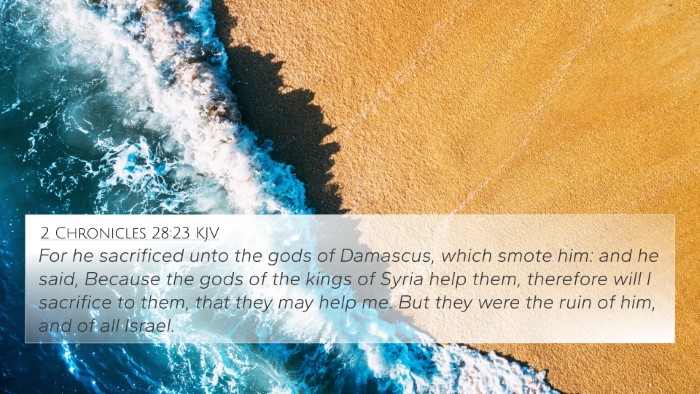
2 Chronicles 28:23 (KJV) »
For he sacrificed unto the gods of Damascus, which smote him: and he said, Because the gods of the kings of Syria help them, therefore will I sacrifice to them, that they may help me. But they were the ruin of him, and of all Israel.
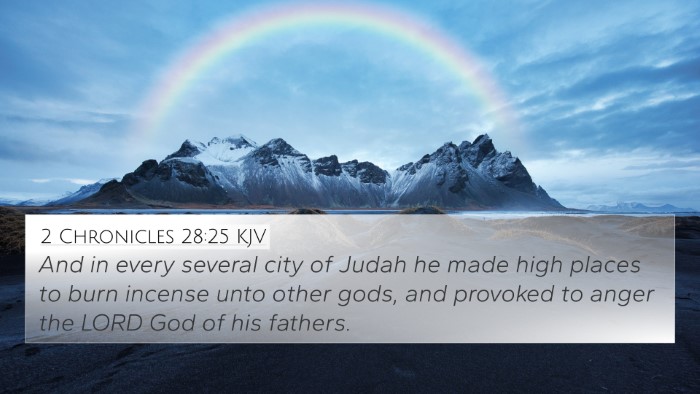
2 Chronicles 28:25 (KJV) »
And in every several city of Judah he made high places to burn incense unto other gods, and provoked to anger the LORD God of his fathers.
2 Kings 16:12 Verse Analysis and Similar Verses
Understanding 2 Kings 16:12
Verse Text: "And when the king was come from Damascus, the king saw the altar: and the king approached to the altar, and offered thereon." (2 Kings 16:12, KJV)
Summary of the Verse
This verse describes an action taken by King Ahaz of Judah after his visit to Damascus, where he encountered the altar of Baal. Upon returning, he seems to have been influenced by what he saw, prompting him to replicate the altar in Jerusalem and offer sacrifices upon it. This act symbolizes a significant turning point in the worship practices of Judah, veering away from traditional Yahweh worship.
Interpretative Insights
Several public domain commentaries provide valuable insights into the implications of this verse:
-
Matthew Henry's Commentary:
Henry observes that King Ahaz's actions were based on his admiration for the idolatrous practices he witnessed in Damascus. His decision to replicate the altar in Jerusalem illustrates his departure from true worship and highlights the broader theme of Israel's covenant unfaithfulness.
-
Albert Barnes' Notes:
Barnes emphasizes that King Ahaz's response is one of political expediency rather than genuine faith. He suggests that Ahaz was seeking to align himself with the powerful influences surrounding him, prioritizing political alliances over spiritual fidelity to God.
-
Adam Clarke's Commentary:
Clarke details the historical context, commenting on the dangers of syncretism—the combining of different religious beliefs. He warns that Ahaz's actions set a precedent for future kings of Judah, leading the nation deeper into idolatry and away from the worship of Yahweh, the God of Israel.
Related Bible Verse Cross-References
This verse can be understood in connection with several other biblical texts:
- 2 Kings 16:10-11: Details on Ahaz's visit to Damascus and his observation of the altar.
- 2 Kings 17:16: References the general theme of idolatry in Israel and Judah.
- Isaiah 7:1,2: Discusses advice to Ahaz amidst military threats, emphasizing trust in God.
- 2 Chronicles 28:23: Illustrates the connections between Ahaz and idolatrous practices.
- Jeremiah 7:18: Speaks to the practices of children gathering wood for the queen of heaven, aligning with Ahaz's actions.
- Exodus 20:3-5: Commands against idolatry, contrasting with Ahaz's actions.
- Deuteronomy 12:2-4: Instruction on worshiping God alone and destroying foreign altars.
Thematic Connections
The actions taken by King Ahaz can be seen as part of a larger thematic narrative regarding the covenant community's faithfulness:
-
Idolatry vs. Faithfulness:
Ahaz's decision reflects a recurring struggle within the nation of Judah and Israel regarding the worship of the one true God versus the allure of foreign gods.
-
Political Influence on Spiritual Practices:
Ahaz's replication of the altar exhibits how political alliances can corrupt religious practices, a concern noted throughout Scripture.
-
Historical Consequences of Leadership:
His actions had lasting effects on the nation, influencing subsequent kings and leading to eventual judgment and exile.
Conclusion
Understanding 2 Kings 16:12 requires recognizing the significant impact of King Ahaz's decision to imitate the altar he saw in Damascus. Through the insights of public domain commentaries, we see the interplay of politics and faith and the dangers posed by straying from God's commandments. This verse is not only a historical account but also a vital warning about the perils of syncretism and idolatry in a covenant community.
Further Study: Tools for Bible Cross-Referencing
To delve deeper into the connections between Bible verses, consider utilizing various tools:
- Bible concordance for word searches and themes.
- Bible cross-reference guide for exploring links between scriptures.
- Cross-reference Bible study methods for structured exploration of related verses.
- Cross-referencing Bible study materials to enhance understanding of Biblical themes.
